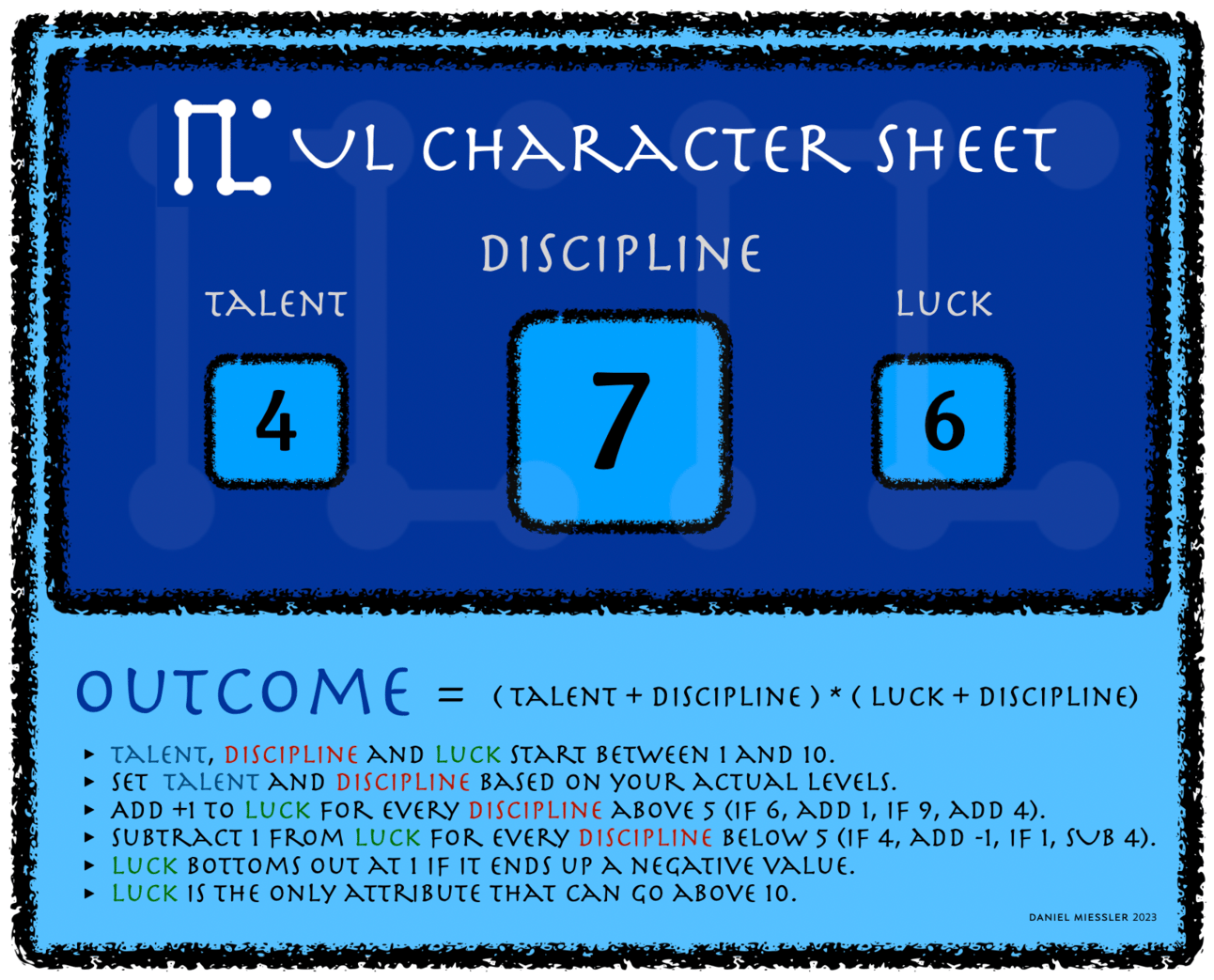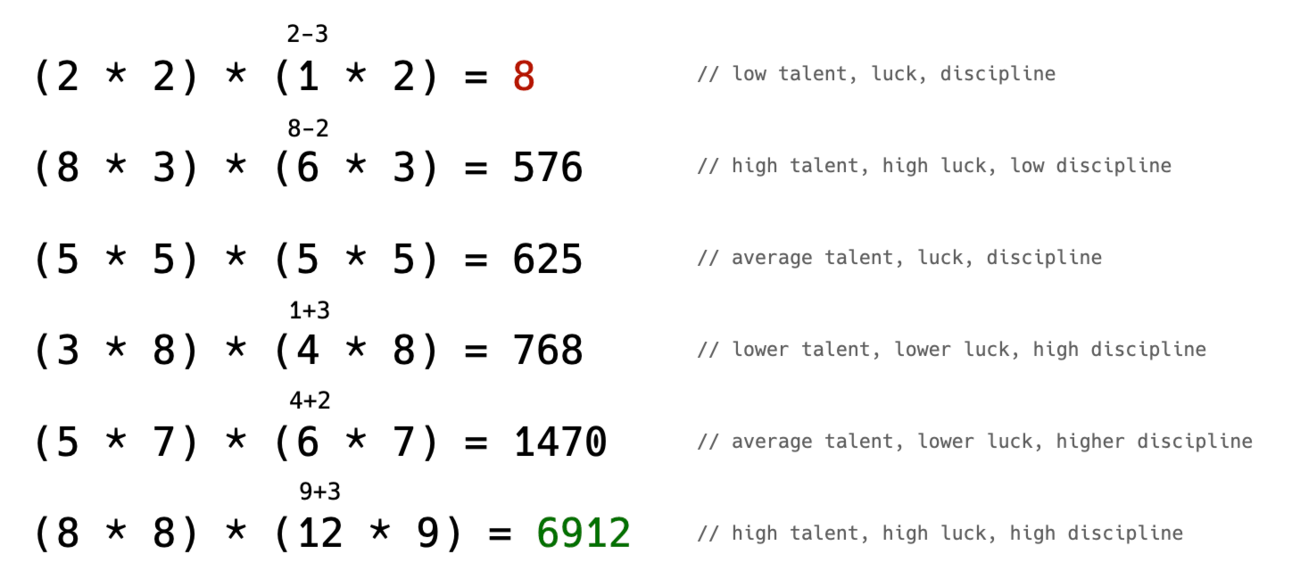The UL Character Sheet

Click for full size version
>I’ve been wanting to capture this for a while now. I’ve made multiple versions of this over the years, but I’m pretty happy with how this one turned out.
The goal of the system is to show the interplay between Talent, Discipline, and Luck, but specifically to show how Discipline matters more than anything.
The premise
The goal here is to model reality, and the main claims of the systems are the following:
Talentmatters a lot.But not nearly as much as
Discipline.Luckis a critical wildcard that can bury or launch you, but it can be significantly altered by either high or lowDiscipline.
Notably, Talent and Discipline are set to a given target’s attribute. Meaning, we’re estimating how talented or disciplined they are in real life.

Luck, however, is random. You roll 1d10 for that. But interestingly, if your Discipline is high enough, you can raise your luck from low to average, or even boost it over the natural maximum of 10.
And Luck also goes in the opposite direction: you can start with average Luck but if your Discipline is low, your Luck ends up lower.
When you combine all of these components, you get a really powerful dynamic where Discipline ends up the absolute most important thing.
Again, that’s my belief of how reality works, and so that’s the model I’ve constructed.
The system

So the arithmetic here isn’t that special or important. What’s important is the range between low values and high values—especially in Discipline and Luck.
One thing to note is that the baseline is around 600, which is where everything is set to average, with lots of motion when values are higher or lower.
Calibration
Don’t over-think this, but here are some guidelines for estimating Talent and Discipline.
Talent
Talent means universal talent, meaning your natural ability to be good at things.
5 is Average
6 is Talented
7 is Notable
8 is Gifted
9 is Extraordinary
10 is Pinnacle
Don’t worry too much about the specifics. Let’s say 10 is like top .01% of the world, 9 is top 1%. 7 and 8 are where you’re well-known either internally or publicly for a thing, and 6 is where you’re not any of those but you’re a step ahead of the pack.
Discipline
Discipline means your ability to build and follow a plan for success. Here are some guidelines for estimating Discipline.
5 is Average
6 is Committed
7 is Dedicated
8 is Resolute
9 is Unyielding
10 is Heroic
Here we’ll do something different for the levels. 10 is where you have a rigorous routine for diet and exercise, and you basically never miss it. Like once or twice a year due to emergencies. 9 is no more than once a month. 8 is where you have a less formal routine but do it over 90% of the time. 7 is where you have a decent routine and you follow it more than 75% but less than 90%. 6 is where you have some kind of routine and you follow it 50%-75% of the time.
Average is where you aren’t doing horribly bad things, and you’re able to maintain some kind of discipline to stay on schedule and meet commitments, but nothing special. 4 and below are for increasingly bad habits, lack of routine, and/or inability to make or follow goals or commitments.
The scenarios

So, given all that—and assuming you at least somewhat agree with the model’s connection to reality—what’s fun is to then run yourself and others you know through the system.
This is the best way to tell whether you think the model tracks to reality or not. So let’s look at a few of the scenarios.
1️⃣If you look at the first scenario, the final score of 8 is abysmal. And this comes from not just the low initial values, but because the low Discipline score lowered the low Luck to the minimum of 1.
This is probably too extreme of a low score, but it directionally and overall tracks for me.
4️⃣Scenario 4 is fascinating because it’s someone with relatively low Talent, but high Discipline. And they even rolled a 1 on Luck! But because of their high Discipline they ended up higher Luck! And this resulted in a higher outome score than average!
In other words, you can still crush life by being exceptionally disciplined—even if you’re not as talented or lucky.
This is precisely the dynamic I was hoping to capture with the model, and why I think it tracks.
Usefulness
I love turning my knowledge into models that I can gain insights from. And to me, models are only useful if they’re…um…useful.
For me, the purpose of a model like this is to inspire myself—and those I care about—to try to be more disciplined.
Basically, I’m trying to use a contrived—yet hopefully somewhat accurate—model to try to tangibly illustrate that high discipline can dramatically improve your life.
And similarly, you can have everything going for you but throw it all away by not being disciplined.
How I use this myself
The way I use this is dead simple.
My natural Discipline score ranges between 4 and 6. But I’ve figured out the hack that we’re able to copy the habits of disciplined people >!
That means I grind.
Constant studying
Constant learning
Constant hacking/building/creating
Constant sharing of what I learn
And most important, I created a life and health routine >, which I parsed from hundreds of hours of study and research, that I follow as much as possible. This routine allows me to do all the things above more often, more consistently, and at higher quality.
Basically, the routine raises my Discipline score—and not by a little bit.
On a good, on-routine day it probably takes my Discipline from a 4 to an 8. So if my Talent is a 7, and my Luck is a 5, here is the variance:
Off-routine: 560
On-routine: 2240
That’s over 4X!
Again the numbers aren’t magical, so it’s not like you can take 2240 somewhere and get something for it. But remember that average in this system is around 600-700. So 2240 is much higher.
And remember, I’m not saying this system makes it real. What I’m saying is, "This is real.", and the system is just properly capturing it.
To me this is precisely how reality works: The people who grind their assess off get outsized outcomes. And this is true regardless of talent and luck.
Recommendations
Play with the system. Plug your numbers in. Get your numbers from others if you don’t think you’re objective enough.
Plug the numbers in for people you care about, and see if it matches your interpretation of reality.
Consider showing the system to people who could use it. But make sure they’re receptive to it and you’re not being an ass.
And finally, if you use the system, and it tracks to reality for you, and it tells you that more Discipline could help you—do what you can to aggressively raise your
Discipline.
It’s the most important stat on the character sheet.
NOTES
Thanks to Jason Haddix for talking with me about this for over a decade and helping me formulate these thoughts.